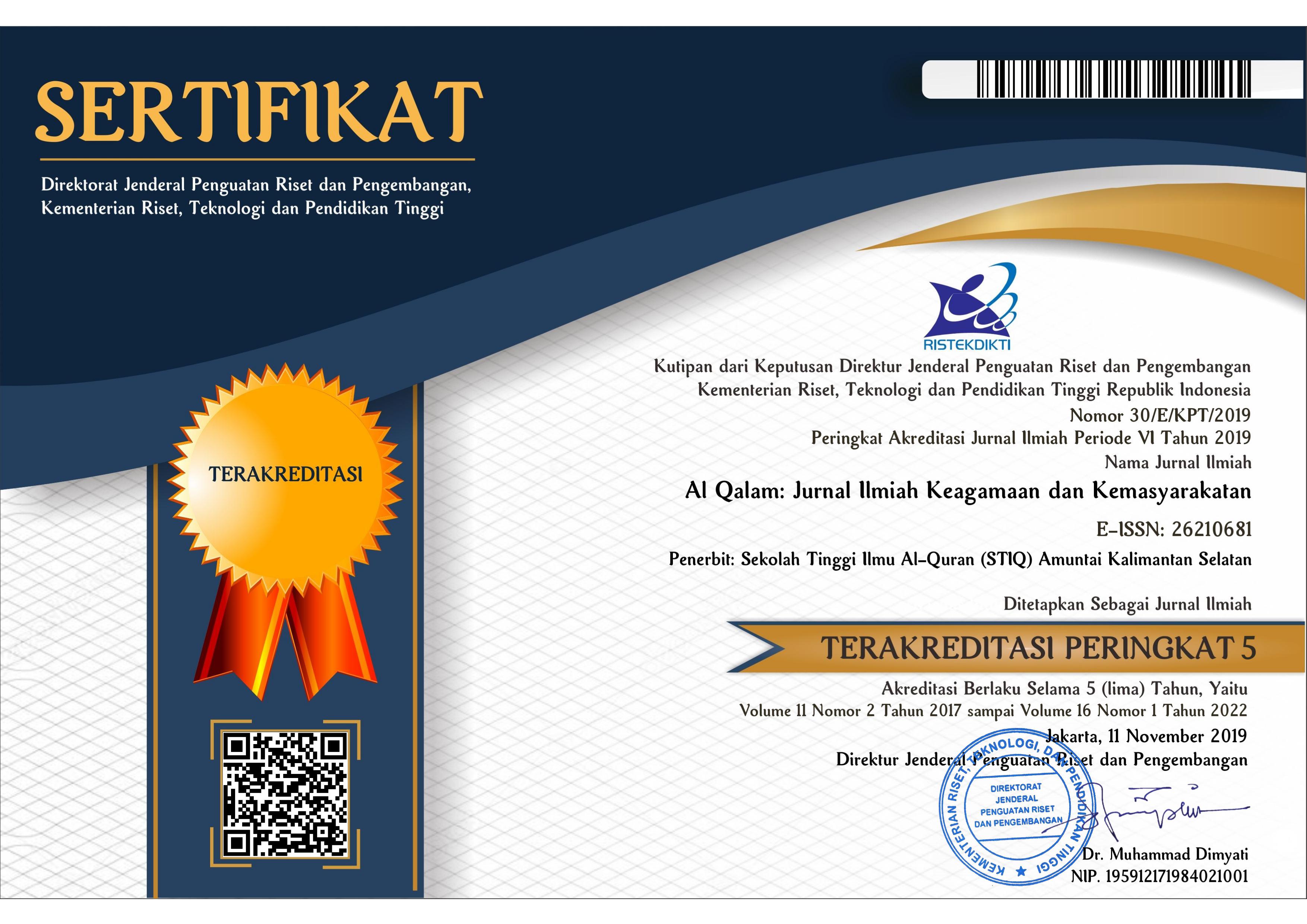Spin-Off Islamic Banking Window In Indonesia
Abstract
Keywords
Full Text:
PDFReferences
Achmad Jufri, and et. al. “Siapkah UUS Untuk Spin-Off? Analisis Kinerja Keuangan UUS Di Indonesia.” MUSLIMPRENEUR 2, no. 1 (2022).
Achmad Shobirin. “Merger Dan Akuisisi: Sebuah Perkawinan Paradoksal.” Jurnal Siasat Bisnis 1, no. 6 (2001).
Afni, Laila. “Solusi Alternatif Spin-Off Premature Bagi Unit Usaha Syariah Di Indonesia.” Al-Muamalat: Jurnal Ilmu Hukum & Ekonomi Syariah 6, no. 1 (2021).
Ahmad Syakir. “Spin-Off Unit Usaha Syariah.” Jurnal Ekonomi Dan Bisnis Islam UIN Sumatera Utara, 2008.
Amalia Nasuha. “Dampak Kebijakan Spin-Off Terhadap Kinerja Bank Syariah.” Al-Iqtishad: Jurnal Ilmu Ekonomi Syariah 4, no. 2 (2012).
Andika, Ari, and et. al. “Analisis Peluang Dan Tantangan Pelaksanaan Kewajiban Spin-Off Unit Usaha Syariah Menjadi Bank Umum Syariah (Studi Kasus PT. BNI Syariah).” Jurnal Al Amwal (Hukum Ekonomi Syariah) 2, no. 1 (2019).
Angrum Pratiwi, Dedy Mainata, and et. al. “Spin-Off Perbankan Syariah Di Indonesia: Proyeksi Perhitungan Dan Studi Kritis Peraturan.” Kodifikasia: Jurnal Penelitian Islam 15, no. 2 (2021).
Arif, M. Nur Rianto Al, and et. al. “Metode Spin-Off Dan Tingkat Profitabilitas: Studi Pada Bank Umum Syariah Hasil Spin-Off.” Iqtishadia 10, no. 1 (2017).
———. “Tipe Pemisahan Dan Pengaruhnya Terhadap Laba Pada Bank Umum Syariah Hasil Pemisahan.” Jurnal Keuangan Dan Perbankan 20, no. 3 (2016).
Bank Indonesia. Peraturan Bank Indonesia (PBI) No.11/10/PBI/2009 tentang Unit Usaha Syariah (2009).
Bismar, Rizky. “Kajian Yuridis Tentang Pemisahan (Spin-Off) Unit Usaha Syariah Menjadi Bank Umum Syariah.” Lex Administratum 5, no. 1 (2017).
Dety Nurfadhilah. “Analisa Dampak Sebelum Dan Sesudah Spin-Off Pada Profitabilitas: Studi Kasus Pada Unit Usaha Syariah Di Indonesia.” Jurnal Ekonomi Dan Industri 20, no. 2 (2019).
Fahmi, Miftahul, and et. al. “Does the Spin-off Policy Change the Shariah Bank Financial Ratio?” Opción 36, no. 27 (2020).
Fitrah, Ramdansyah. “Menelisik Mekanisme Pembentukan Bank Umum Syariah Di Indonesia.” Jurnal As-Salam 1, no. 3 (2017): 106–18.
Ghaisani, Zata, and et. al. “Analisis Perbandingan Kinerja Keuangan Pada Bank Umum Syariah Sebelum Dan Sesudah Melakukan Spin-Off (Studi Pada Bank BTPN Syariah).” Jurnal Ilmiah Mahasiswa Ekonomi Akuntansi (JIMEKA) 5, no. 1 (2020).
Ghofur, Abdul. Hukum Perbankan Syariah (UU No.21 Tahun 2008). Bandung: Refika Aditama, 2013.
Ginting, Jamin. Hukum Perseroan Terbatas. Bandung: PT. Citra Aditya Bakti, 2007.
Hanawijaya. “Outlook Dan Konsolidasi Perbankan Syariah Menuju Target Spin-Off 2023,” 2022.
Hardani, and et. al. Metode Penelitian Kualitatif & Kuantitatif. Yogyakarta: CV. Pustaka lmu Group Yogyakarta, 2020.
Hariyani, Iswi, and et. al. Merger, Konsolidasi, Akuisisi, & Pemisahan Perusahaan. Jakarta: Visimedia, 2011.
Hilman, Iim. “Sharia Business Unit Spin-off: Strategic Development Model of Sharia Banking in Indonesia.” Internasional Jurnal of Islamic Banking and Finance Research 2, no. 2 (2018).
Indriantoro, Nur, and et. al. Metodologi Penelitian Bisnis-Untuk Akuntansi Dan Manajemen. Yogyakarta: CV. Andi Offset, 2018.
Irwan Tri Nugroho. “Is Spin-off Policy an Effective Way to Improve Performance of Islamic Banks?Evidence from Indonesia.” Journal Pre-Proof, 2020.
Ismawati Haribowo. “The Indonesian Islamic Bank’s Spin-Off: A Study in Regional Development Banks.” Al-Iqtishad: Jurnal Ilmu Ekonomi Syariah 9, no. 1 (2017).
Itang. “Peluang Dan Tantangan Spin-off Unit Usaha Syariah Menjadi Bank Umum Syariah.” Jurnal Al-Qalam 33, no. 1 (2016): 24–45.
Kuncoro, Mudrajat. Metode Riset Untuk Bisnis & Ekonomi. Jakarta: Erlangga, 2009.
M Nur Rianto Al Arif. “Does the Spin-off Policy Can Accelerate the Deposit Funds in the Indonesian Islamic Banking Industry?” Journal of Business and Retail Management Research (JBRMR) 13, no. 1 (2018).
———. “Evaluation of the Spinoffs Criteria: A Lesson from The Indonesian Islamic Banking Industry.” Iqtishadia 11, no. 1 (2018).
———. “Keterkaitan Kebijakan Pemisahan Terhadap Tingkat Efisiensi Pada Industri Perbankan Syariah Di Indonesia.” Jurnal Keuangan Dan Perbankan 19, no. 2 (2015).
———. “The Alternative Strategies for Accelerating Islamic Banking Growth: Mergers, Spin-Offs, Acquisitions and Conversions.” Al-Ulum 20, no. 1 (2020).
M Nur Rianto Al Arif, and et. al. “The Islamic Banking Spin-Off: Lessons from Indonesian Islamic Banking Experiences.” JKAU: Islamic Econ 30, no. 2 (2017).
Mentari, Nikmah, and et. al. “Sustainable Development Goals (SDGs) Principle Towards Sharia Business Unit Pre-Spin Off 2023.” UNIFIKASI: Jurnal Ilmu Hukum 6, no. 2 (2019).
Nesneri, Yessi, and et. al. “Strategi Unit Usaha Syariah Bank Umum Konvensional Dalam Menghadapi Spin-Off 2023 (Studi Pada PT. BPD Riau Dan Kepulauan Riau).” Jurnal Tabarru’ 3, no. 2 (2020): 335–46.
Otoritas Jasa Keuangan. Peraturan Otoritas Jasa Keuangan (POJK) NO.59/POJK.03/2020 Tentang Persyaratan dan Tata Cara Pemisahan Unit Usaha Syariah (2020).
———. “Sejarah Perbankan Syariah,” 2021. https://www.ojk.go.id/id/kanal/syariah/tentang-syariah/pages/sejarah-perbankan-syariah.aspx.
———. “Statistik Perbankan Syariah (SPS) Desember 2021,” 2021.
Prima Naomi. “Financial Performance of Sharia Banks Before and After Spin-Off.” Journal of Innovation in Business and Economics 1, no. 2 (2017).
Rachmania, and et. al. “Analisis Tingkat Kesehatan Bank Syariah Sebelum Dan Sesudah Spin-Off.” Jurnal Manajemen Dan Bisnis (Ekspektra) 1, no. 1 (2017).
Rasyid, Fathi, and et. al. “Analisis Kesiapan Unit Usaha Syariah Dalam Menghadapi Kebijakan Spin-Off Di Indonesia.” Jurnal Ilmiah Mahasiswa FEB 5, no. 1 (2016): 1–21.
Republic of Indonesia. UU Nomor 21 Tahun 2008 tentang Perbankan Syariah (2008).
———. UU Nomor 40 Tahun 2007 tentang Perseroan Terbatas (2007).
Rifin, Amzul, Imam T Saptono, and H R Dewati. “Pemilihan Metode Spin Off Unit Bisnis Syariah Dengan Pendekatan Analisa Faktor (Studi Kasus PT. BNI Syariah Dan PT. Bank Syariah BRI).” Al-Muzara’ah 3, no. 2 (2015): 122–35. https://doi.org/10.29244/jam.3.2.122-135.
Rongiyati, Sulasi. “Pengembangan Perbankan Syariah Melalui Pelaksanaan Kewajiban Pemisahan Unit Usaha Syariah”, Jurnal Negara Hukum.” Jurnal Negara Hukum 6, no. 1 (2015): 65–78.
Rukmana. “Peluang Meningkatkan Kinerja Dan Daya Saing Unit Usaha Syariah (UUS) Melalui Spin-Off Menjadi Bank Umum Syariah (BUS) Di Indonesia.” In Prosiding SENTIA, 2016.
Rusydiana, Aam Slamet, and et. al. “Spin-Off Policy of Sharia Bank: Is It Profitable.” Al-Iqtishad: Jurnal Ilmu Ekonomi Syariah 11, no. 2 (2019).
Septaredho, Muhammad, and et. al. “Analisis Peluang Dan Tantangan Pelaksanaan Kewajiban Spin-Off Unit Usaha Syariah Menjadi Bank Umum Syariah.” Jurnal Manajemen Bisnis (JMB) 34, no. 1 (2021): 42–51.
Sumyati, and et. al. “Office Channeling Pasca Spin-Off Bank BNI Syariah Dari Unit Usaha Syariah Menjadi Bank Umum Syariah.” Diponegoro Law Journal 5, no. 3 (2016).
Sunggono, Bambang. Metodologi Penelitian. Jakarta: Raja Grafindo Persada, 2007.
Umam, Khotibul. Corporate Action Pembentukan Bank Syariah (Akuisisi, Konversi Dan Spin-Off). Yogyakarta: Gadjah Mada University Pres, 2015.
———. “Peningkatan Ketaatan Syariah Melalui Pemisahan (Spin-off) Unit Usaha Syariah Bank Umum Konvensional.” Jurnal Mimbar Hukum 22, no. 3 (2010): 607–24.
Wirartha, I Made. Metodologi Penelitian Sosial Ekonomi. Yogyakarta: CV. Andi Offset, 2006.
DOI: http://dx.doi.org/10.35931/aq.v17i1.1898
Refbacks
- There are currently no refbacks.
Copyright (c) 2023 Al Qalam: Jurnal Ilmiah Keagamaan dan Kemasyarakatan
Al Qalam: Jurnal Ilmiah Keagamaan dan Kemasyarakatan
index by:
Publish by:
Sekolah Tinggi Ilmu Al-Qur'an Amuntai
Contact us:
Address: Jl. Rakha Pakapuran, Amuntai Utara
Kabupaten : Hulu Sungai Utara
Kode Pos : 71471
Provinsi : Kalimantan Selatan
Telephone : 085251613000
Email: hafizhihusinsungkar@gmail.com

This work is licensed under a Creative Commons Attribution 4.0 International License


